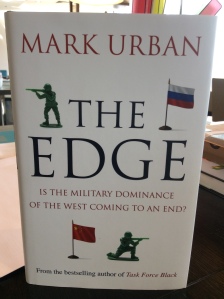
In his seminal book about the history of Israel’s armed forces, Tsahal, military historian Pierre Razoux writes:
“Even though its influence tends to diminish, the army still occupies a central role in Israeli society. To better understand its importance, we must reiterate that more than 10% of the Jewish population either serves in the army or regularly serves in the army reserves, which makes Israel the most militarized country in the Middle East. (my translation)” (p. 8).
For that reason, many important military figures also played a dominant role in public life. The names of Moshe Dayan, Yitzhak Rabin, Ehud Barak and Ariel Sharon are the better known in that category and easily come to mind in any discussion on that topic. All in all, few other countries can count on so many military figures in key civil leadership positions.
Which inevitably brings us to politics. Commenting on the results of the recent legislative elections for the Israeli left, Arik Henig perceptively wrote: “Since the 1977 political upheaval, Labor won the elections only twice, when it was headed by two former IDF chiefs of staff: Yitzhak Rabin in 1992 and Ehud Barak in 1999. […] When will [the people of the Labor party] they learn that the Israeli public prefers to be led by chiefs of staff?”
In other words, the Israel left needs a former IDF chief of staff if it wants to expect to return to success on the electoral battlefield.
Many will be tempted to perceive this observation as military fetishism. But it’s not the case. In a post-election analysis, Daniel Kurtzer, an academic who served as US Ambassador to Israel from 2001 to 2005, summarized the three challenges that must be met by the Labor party, if it wants to leave the opposition benches in the near future:
“First, it must persuade Israeli voters, especially those of Russian origin, that it can handle Israel’s security challenges at least as well as, if not better than, the right. (Former military intelligence director Amos Yadlin was recruited by Herzog’s party to be its security face, but his voice was almost inaudible during the campaign.) Second, the left must induce the Sephardim to put past grievances behind and to vote with their pocketbooks. And, third, it must overcome the perception that support for peace with the Palestinians is akin to appeasement and therefore endangers Israel.”
The Prime ministership of Likud leader Benjamin Netanyahu will not last forever and the opposition will inevitably become tired enough with loosing elections that they will decide to introduce a new figure whose presence, values and positions will fill the gap between the expectations of Israelis and the Labor party.
Much like Catholics like to observe various Cardinals to try to find out who might become the next Pope, anybody who’s minimally interested in Israeli politics and its future would be well-advised to keep an eye in the ranks of former IDF chiefs of staff to spot who might trade the image of the olive green military outfit general for the statesman persona.
Tsahal has always been an integral part of Israel’s history. And it will continue to play a determinant role in its future.






